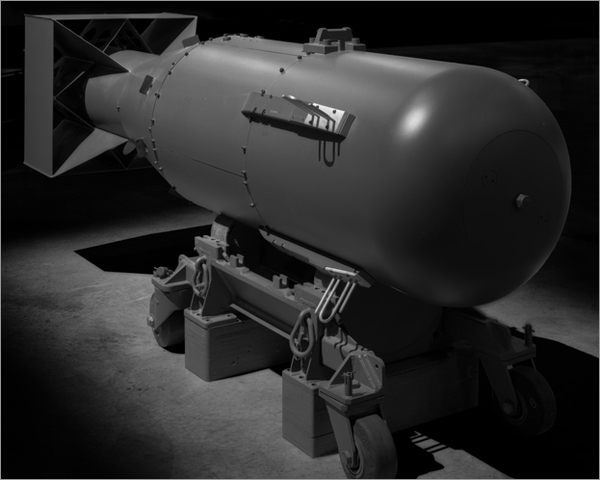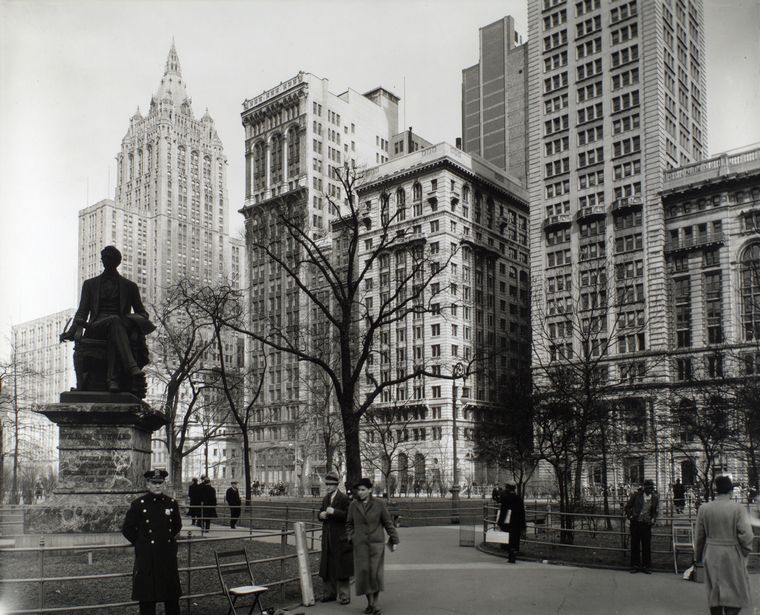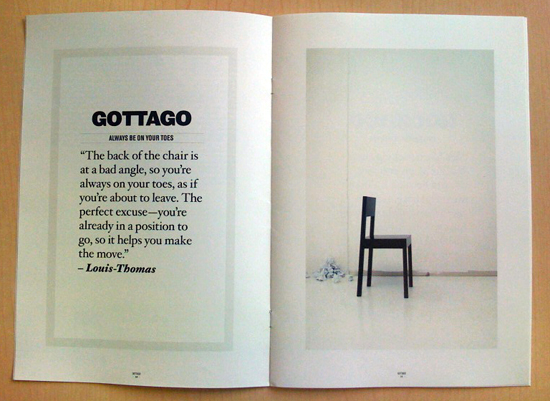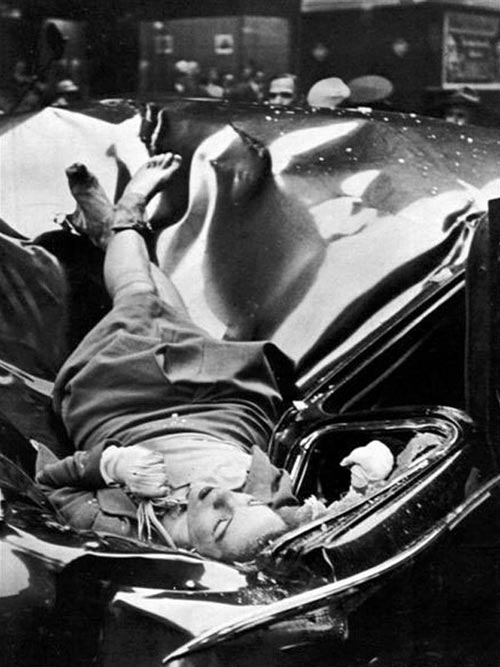Weapons of Mass Destruction
“Little Boy” (Hiroshima Atomic Bomb) 1945
Nice set of black and white (and infrared?) photos of cold war era Weapons of Mass Destruction.
See also: “Atomic John” in The New Yorker
The single, blinding release of pure energy over Hiroshima, Japan, on August 6, 1945, marked a startling and permanent break with our prior understandings of the visible world. Yet for more than sixty years the technology behind the explosion has remained a state secret.
The most accurate account of the bomb’s inner workings—an unnervingly detailed reconstruction, based on old photographs and documents—has been written by a sixty-one-year-old truck driver from Waukesha, Wisconsin, named John Coster-Mullen, who was once a commercial photographer, and has never received a college degree.
Flat-pack accounting
The overall set-up of IKEA minimises tax and disclosure, handsomely rewards the founding Kamprad family and makes IKEA immune to a takeover. And if that seems too good to be true, it is: these arrangements are extremely hard to undo. The benefits from all this ingenuity come at the price of a huge constraint on the successors to Ingvar Kamprad, the store’s founder, to do with IKEA as they see fit.
The parent for all IKEA companies—the operator of 207 of the 235 worldwide IKEA stores—is Ingka Holding, a private Dutch-registered company. Ingka Holding, in turn, belongs entirely to Stichting Ingka Foundation. This is a Dutch-registered, tax-exempt, non-profit-making legal entity, which was given the shares of Mr Kamprad in 1982. Stichtingen, or foundations, are the most common form of not-for-profit organisation in the Netherlands; tens of thousands of them are registered.
Most Dutch stichtingen are tiny, but if Stichting Ingka Foundation were listed it would be one of the Netherlands’ ten largest companies by market value.
Posted at The Economist.
One tiny apartment, dozens of rooms
Hong Kong architect Gary Chang has renovated his tiny apartment four times since he’s owned it. The most recent renovation is called “The Domestic Transformer”.
Mr. Chang hopes that some of his home’s innovations might be replicated to help improve domestic life in Hong Kong, which has been troubled in recent years. The population grew by nearly a half-million in just the last 10 years, and between 2003 and 2007, reports of new cases of child, spousal and elder abuse nearly doubled, something social workers attribute in part to new social pressures caused by the city’s ongoing shortage of space.
“It’s a big problem,” Mr. Chang said. “Killing each other is not uncommon.”
“People feel trapped,” he said. “We have to find ways to live together in very small spaces.”
In Mr. Chang’s solution, a kind of human-size briefcase, everything can be folded away so that the space feels expansive, like a yoga studio.
The wall units, which are suspended from steel tracks bolted into the ceiling, seem to float an inch above the reflective black granite floor. As they are shifted around, the apartment becomes all manner of spaces — kitchen, library, laundry room, dressing room, a lounge with a hammock, an enclosed dining area and a wet bar.
Via kottke.org.
Mirror, Mirror on the Wall
Errol Morris:
During the last week of the Bush administration, I asked the head photo editors of these news services — Vincent Amalvy (AFP), Santiago Lyon (AP) and Jim Bourg (Reuters) — to pick the photographs of the president that they believe captured the character of the man and of his administration.
Via Daring Fireball.
Earth, observed
The Earth Observatory is a website run by NASA’s Earth Observing System Project Science Office (EOSPSO). Bringing together imagery from many different satellites and astronaut missions, the website publishes fantastic images with highly detailed descriptions, feature articles and more. […] Gathered here are some standout photographs from the collections in the Earth Observatory over the past several years.
At The Big Picture.
Run Lola Run Lola Run Lola Run Lola Run
Run Lola Run Lola Run Lola Run Lola Run from shiffman on Vimeo.
Via kottke.org.
Britain From Above
Britain looks very different from the skies. From a bird’s eye view of the nation, its workings, cities, landscapes and peoples are revealed and re-discovered in new and extraordinary ways.
Particular nuggets I have found so far include: The Great Migration in the Sky, Taxis in London and Ships Crossing the Channel.
Via 5 Best Data Visualization Projects of the Year at Flowing Data via Beyond the Beyond.
Changing New York
Included in the NYPL’s recent addition to the Flickr Commons project is Changing New York, a selection of photos taken of NYC in the 1930s by Berenice Abbott as part of a government program for unemployed artists.
Via kottke.org.
Fleeting Seating: The Slightly Uncomfortable Chair Collection
“I remember when I was a kid,” Pelletier explains in the text within the brochure, “there was a rumour – I don’t know if it was true - that at McDonalds, the benches were made so that you wouldn’t spend too much time there.” It was from that thought the idea for the Slightly Uncomfortable Chair Collection (SUCC) came.
Via kottke.org.
The Year in Media Errors and Corrections
Regret the Error does their annual round up of best corrections:
Best Recipe Error
A report from Reuters:Celebrity chef Antony Worrall Thompson has apologized after accidentally recommending a potentially deadly plant in organic salads.
The chef and TV presenter said in a magazine article that the weed henbane, also known as stinking nightshade, made an excellent addition to summertime meals…
Henbane, or Hyoscyamus niger, is toxic and can cause hallucinations, convulsions, vomiting and in extreme cases death.
Worrall Thompson, who was discussing his passion for organic foods, had confused the plant with another of a similar name.
The magazine “Healthy & Organic Living” printed an urgent warning: “Henbane is a very toxic plant and should never be eaten. As always, check with an expert when foraging or collecting wild plants.”
Henbane, a close relative of deadly nightshade, was used by Dr Crippen to kill his wife in 1910, and is thought to have been the main ingredient in the poison Romeo took in Shakespeare’s play Romeo and Juliet.”
The chef had intended to refer to fat hen, a weed rich in vitamin C, that is edible, media reports said…
Worrall Thompson was reported in the media as saying the confusion had been “a bit embarrassing.”
Via kottke.org.
An Engineering Evaluation of SHA-3 candidates
Niels [Ferguson, of the Skein team] has started a page of SHA-3 engineering comparisons.
Yes, they are biased, but I still trust the results.
Via Schneier on Security.
Beijing Cubism: How ETFE Revolutionized the Bubble
ETFE is temperature-resistant, lightweight (1/100th the weight of glass), recyclable, non-toxic when exposed to flame (it actually shrinks away from heat, thus helping to vent smoke out of a burning building), highly insulative, non-porous, and non-stick. Even better, its high-tensile strength makes it easy to manipulate—it can be spun into thin sheets for ease of transport then inflated on-site to create the “pillow” effect of the Aquatics Center walls. It can also be finished in varying degrees of translucence—as transparent as glass or opaque as glass bricks.
Via at cityofsound.
Deformation
Robert C. Wiles, 1947
On May Day, just after leaving her fiancé, 23-year-old Evelyn McHale wrote a note. 'He is much better off without me ... I wouldn't make a good wife for anybody,' ... Then she crossed it out. She went to the observation platform of the Empire State Building. Through the mist she gazed at the street, 86 floors below. Then she jumped. In her desperate determination she leaped clear of the setbacks and hit a United Nations limousine parked at the curb. Across the street photography student Robert Wiles heard an explosive crash. Just four minutes after Evelyn McHale's death Wiles got this picture of death's violence and its composure.
Via Super Colossal.
See also Crashing to Earth, Again and Again
Front Inc
An article in the New York Times on facade engineers Front Inc. They are responsible for engineering the facades of The Seattle Public Library, the Toledo Glass Museum, the New Museum of Contemporary Art in New York and the CCTV Building in Beijing amongst others.
Very poorly written article, but interesting subject.
Via Super Colossal.
Moving Pictures
Posted at Square America:
Square America is a site dedicated to preserving and displaying vintage snapshots from the first 3/4s of the 20th Century. Not only do these photographs contain a wealth of primary source information on how life was lived they also constitute a shadow history of photography, one too often ignored by museums and art galleries. Or at least that’s what I tell people- more accurately, the site is a catalog of my obsession with vintage photographs.
What Sun Should Do
Tim Bray on Sun:
Sun is going through a lousy spell right now. Well, so is the world’s economy in general and the IT business in particular, but this is about Sun. This is my opinion about what my employer should do about it. [. . .] Sun should adopt a laser focus on building a Sun Web Suite and becoming the Web application deployment platform of choice. It’s a large space, a growing space, and one where we can win.
He is obviously absolutely right, there is no place for the old Sun in this world. However Sun does have some excellent tech, and importantly they seem to still have a lot of top engineers, so if they can manage a major restructuring they have a fighting chance.




